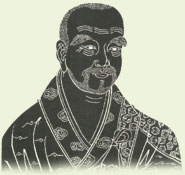ZEN MESTEREK ZEN MASTERS
« Zen főoldal
« vissza a Terebess Online nyitólapjára

妙峰福登 Miaofeng Fudeng (1540-1612)
The title chanshi (禪師) appeared in different contexts during the Ming. In one documented case, the Chinese monk Fudeng (or Miaofeng, 1540-1613), a master builder and renowned monk who enjoyed the patronage of Empress Dowager Li for thirty years during the Wanli (萬曆) reign period, was given the title Huguo chanshi (Protection of the Dynasty Chan Master). He received this title, as well as the position of abbot, after completing the rebuilding of Xiantong monastery (now renamed Da huguo shengguang yongming) at Wutaishan.
Xiantong Temple is the oldest temple in China and also the biggest on Wutai Mountain. Originally built in the Eastern Han Dynasty, it has been placed under state protection. Covering eight hectares, the temple has 400-odd halls. Inside, there are 3 pure copper halls cast in the Ming Dynasty (1368-1644), engraved with fine patterns and bronze Buddhist figurines. On the sides, two 13-storied bronze towers also made in the Ming dynasty, each with a height of eight meters, are covered with cast Buddhist figurines, carved patterns and various inscriptions.
A Study of the Three Buddhist Copper Hall Projects, 1602-1607
by Jianwei Zhang
Journal of Asian Studies; May 2014, Vol. 73, Issue 2, pp. 289-322.
http://www.taodocs.com/p-22139518.html
The 'Boundless Halls' of Builder Monk Miaofeng (1540-1613)
by John Millbank
http://www.academia.edu/8211985/The_Boundless_Halls_of_Builder_Monk_Miaofeng_1540-1613_
Engaged but not Entangled: Miaofeng Fudeng 妙峰福登 (1540-1612) and the late Ming Court
by Zhang Dewei
https://www.academia.edu/27608506/Engaged_but_not_Entangled_Miaofeng_%E5%A6%99%E5%B3%B0%E7%A6%8F%E7%99%BB_1540-1612_and_the_late_Ming_Court.pdf
Miaofeng Fudeng was a most respected monk who had incomparable influence in the late Ming samgha, except a few leading masters like Hanshan Deqing, Zibo Zhenke, and Yunqi Zhuhong. However, he has been unduly ignored by later generations. This paper reconstructs his life by piecing together fragmentary information and, in connection with his religious and non-religious life, explores how he obtained and maintained his extraordinary influence. In particular, two features stood out in his life. First, Fudeng received huge favors repeatedly from the inner court but remained rooted deeply in local society. Second, Fudeng was extremely active in the religious and social field but clearly shunned from politics. Consequently, Fudeng maximized his influence and avoided being entrapped in court strife, which proved disastrous to both Deqing and Zhenke. Fudeng represented a stable constructive force in the contemporary Buddhist community, and his formidable achievements enriches our understanding of the samgha-state relationship.
Dr. Dewei ZHANG 張德偉
https://fah.umac.mo/staff/staff-philosophy/zhang-dewei/Challenging the Reigning Emperor for Success: Hanshan Deqing and Late Ming Court Politics
by Zhang Dewei
Journal of the American Oriental Society, 134.2 (2014) 263-285.
https://www.academia.edu/9840583/Hanshan_Deqing_D._Zhang_